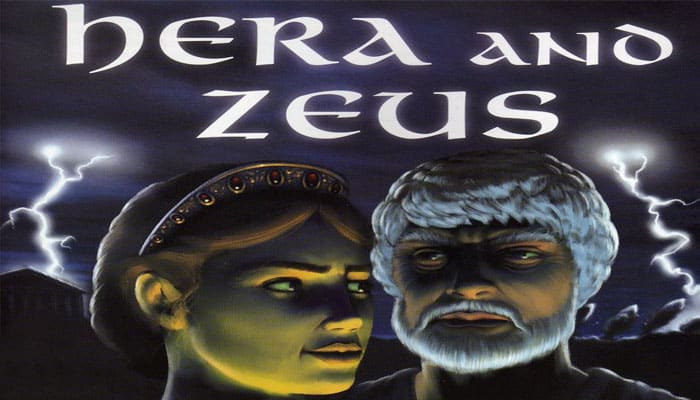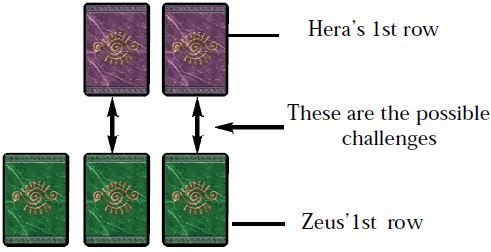
Zeus, the father of Gods, and his wife Hera often disagreed on matters both earthly and Olympic. Eventually, the disagreement became a full-fledged feud with both Zeus and Hera calling upon the other Gods from Olympus and mortals from earth to support him or her against the other.
Cyclops, Amazon, Medusa, Hydra, Pegasus, and others joined the feud. Both have taken a hostage (Hera has Io and Zeus has Argus).
The players take the roles of Hera and Zeus and use strategy and cunning to pit their allies against the allies of the other to rescue the hostages. It is winner take all for the rescue of the hostages and control of Olympus!

Components
- 86 cards
- 1 Zeus figure
- 1 Hera figure
- 2 summary cards
- Instructions
Object of the Game
Hera wins when she finds Argus and liberates him. Zeus wins when he finds Io and liberates her.
Setup
-
The players sit opposite each other.
-
One player takes the role and cards of Hera (violet) and the other player takes the role and cards of Zeus (green).

-
Each player takes the figure of his God or Goddess and places it on his side of the table. Each player takes the summary card for his God or Goddess. The summary cards briefly describe the special powers of the cards and how often each occurs in the deck.
-
Each player thoroughly shuffles his card deck face down and takes the topmost 9 cards as his starting hand, which is kept hidden from his opponent.
The players place the remaining cards in their decks face down next to their God or Goddess figure.
If a player draws one of the hostage cards (Argus or Io) as one of his first 9 cards ,he shows the card to his opponent, draws another card to replace it, and shuffles the hostage card back into his deck.
The Cards

Each player has a deck of 43 cards. Most of the cards have a number from 0 to 7 in the upper right and left corners.
The number is the strength of the card in a challenge. The higher the number, the stronger the card. These cards are played face down when first played in the game.

Some cards have mythological symbols below the numbers.
These cards have special powers that are explained later and on the summary cards.

A few cards have the mythological symbol only in the upper left and right corners, but no numbers.
These cards are never played on the table, but are played for the special power they have and then discarded.
These special powers are explained later and on the summary cards.
The Playing Field
Each player chooses 3 cards from his hand and places them on the table face down next to each other as his first row.
During the game, the players will add other cards to the playing field. Each player may add up to 3 more rows of 1,2, or 3 cards each. These rows are played behind the first row.
Thus, behind each card in the first row, a player may place 1,2, or 3 cards. The card in the first row and the cards behind form a column. A column can have 1,2,3,or 4 cards.
Therefore, a player may have at most four rows and three columns on his side of the playing field.
The playing field looks like this:

Game Play
The players alternate turns starting with the starting player. The starting player is the player who was most recently in a Greek restaurant. If neither player has ever visited a Greek restaurant, Hera begins.
On a player's turn, he has as many action points to use as he has columns at the beginning of his turn. This will be 1,2, or 3, except when a player has the Hera or Zeus figure in play. When a player has one of these figures in play, he gets 4 action points.
For example, if a player starts his turn with 2 columns, he has 2 action points to use.
A player may take the following actions for the cost of 1 action point each:
- draw one card,
- play a card on the playing field,
- challenge an opponent's card, or
- play a Mythology card.
A player may take any specific action as often as he has action points to spend. The actions can be taken in any order.
For example, a player may (with 3 action points) draw a card, challenge an opponent's card, and then draw another card.
A player must spend all action points he is allowed. He cannot save them for later or refuse to use them.
Note: If a player begins his turn with no cards on his side of the playing field, he loses the game (see Ending the Game and the Winner)!

1. Draw One Card
Draw one card costs one action point. The player takes the topmost card from his card deck and adds it to his hand. A player may have at most twelve cards in his hand. When a player has exhausted his card deck, he may no longer use this action.
2. Play a Card
Play a card on the playing field costs one action point. The player always plays the new card face down on his side of the playing field.
The player may play the card in front, behind, or between cards in a column on the playing field.
If a player wants to play a card where another card lies, he moves that card, and other cards behind it, backward (towards himself) to make room for the new card. After a new card is played, the cards in the column must all be next to each other with no empty spaces.
A player need not fill in a row with three cards before starting a new row. Similarly, a player need not fill a column before placing cards in another column.
A player may not voluntarily remove one of his cards from the playing field. Therefore, a player must carefully plan each of his moves.
As indicated above, a player may move a card by placing a new card. Also, playing Dionysus allows a player to rearrange cards within a column or columns.
Remember: Each player's side of the playing field may have only 4 rows and 3 columns.
A player may look at his face down cards at any time.
3. Challenge an Opponent's Card
Challenge an opponent's card costs one action point. Players may only use challenges beginning with their second turns in the game.
4. Play a Mythology Card
Play a Mythology card costs one action point. The player places the card in his discard pile after using its power.
The Challenge
When the opposing columns from the two opponents both have cards,a challenge is possible. A player may not challenge an opponent's card diagonally.
A player is not obligated to initiate a challenge unless no other action is possible.
Note: Players may not use the challenge action during the first round.
Only cards in the players' first rows may challenge (except Pegasus) or be challenged Io, Argus, Medusa, and Pandora may never initiate a challenge.

The player who initiates the challenge slides the challenging card forward (toward the challenged card), turns the card face up (if it was face down), and announces the strength of the card.
His opponent turns the challenged card face up (if it was face down) and announces its strength. The card with the higher strength wins the challenge.
The losing player puts the defeated card face up on his discard pile. The winning card remains face-up in the first row and may challenge again in this round.
When the two cards have equal strength, both are discarded by the players. When a card loses a challenge and is discarded, the player moves the cards in that column forward to fill the empty space.
Mythological Actions 
Some cards have mythological powers (indicated by the mythological symbols) in addition to their strength and other cards have only mythological powers. The mythological powers of the cards are explained below.

Hera and Zeus
When played, Hera or Zeus enters the playing field. In the turn that Hera or Zeus is played, the player gets four action points to spend, regardless of the number of columns he has on the playing field.
If the card is played after the player has used one or more action points, he does not get four more but treats his turn as though he had four to start with.

The player pays no action points to play the card. The card is discarded when played. Then, the player places his Hera or Zeus figure in his 1st row, replacing the card there. The player then moves all the cards in that column, including the card in the 1st row, back one space.
If a column has 4 cards, the Hera or Zeus figure may not be placed in that column. If all 3 columns have 4 cards, the player may not play the card. The Hera or Zeus figure may not be played in an empty column.
Once a figure has been placed, the player may not move his figure, even with Dionysus. However, he may remove his figure as one of his actions. Neither player may initiate a challenge, including a Pegasus from his hand, in a column that has a figure in it.
To remove the Hera or Zeus figure from an opponent's 1st row, a player must challenge the figure with a Pegasus card from his hand.
When a player does this, he immediately discards the Pegasus card and his opponent removes the Hera or Zeus figure from the playing field. The figure remains on the player's side of the table as it may be used again.
The opponent then moves the cards that were behind the Hera or Zeus figure forward in the column to fill the empty space.
As long as a player has his Hera or Zeus figure in his 1st row, he gets four action points to use per turn, regardless of the number of columns he has.
Medusa

Medusa may only be defeated in a challenge by Hero or Amazon.
When any card, except Hero or Amazon, challenges Medusa, the card loses the challenge and is discarded. Medusa remains face-up on the playing field.
When Hero or Amazon challenge Medusa, she loses and is discarded. The Hero or Amazon card remains face-up on the playing field.
Medusa is a strong passive card.Medusa can never initiate a challenge.
Pandora

Pandora, with her famous box, is a very dangerous card - for both the player and his opponent.
When any card challenges Pandora, all cards in that column are lost and discarded. Each player determines the order in which the cards are placed on his discard pile.
If Io or Argus is in the affected column, the player who loses Io or Argus loses the game.
When a player challenges a card in his opponent's hand with Pegasus and selects Pandora, the opponent loses all cards from his hand and places them on his discard pile in the order he wants.
If Io or Argus is in the opponent's hand, the opponent loses (see Ending the Game and the Winner).
Pandora can never initiate a challenge.
Pegasus

In a challenge, Pegasus has a strength of only 1. Pegasus' real value to a player is that of a scout.
Pegasus may be used in several ways:
-
Pegasus challenges an opponent's hand card.
For one action point, a player may use Pegasus to challenge a card in his opponent's hand. The player immediately discards the Pegasus card and selects one card randomly from his opponent's hand.
If the selected card is Io or Argus, the game ends and the player who played the Pegasus card is the winner (see Ending the Game and the Winner)! Note: thus, it is not advisable for a player to hold Io or Argus in his hand for long.
If the selected card has a mythological symbol on it (except Amazon or Hero), he places the card on his opponent's discard pile.
If the selected card has a strength of 2 to 7, he places the card face up in his opponent's 1st row in the column of his choice. He may not place the card in a column with 4 cards or in a column with the Hera or Zeus figure in the 1st row. If there is no row where the card may be placed, he places it on his opponent's discard pile.
or
-
Pegasus challenges an opponent's card or figure in the 1st row
For one action point, a player may use Pegasus to challenge an opponent's card or the Hera or Zeus figure in the opponent's 1st row. The player immediately discards the Pegasus card.
The opponent turns the challenged card face up if it is face down.If the challenged card has a strength of 0 or 1, it is discarded; otherwise, the card remains face-up. If the player uses Pegasus to challenge the opponent's Hera or Zeus figure, the opponent removes the figure immediately.
Note: for a single action point, a player can use Pegasus to force his opponent to turn over a card in his first row.
or
-
Pegasus played to the player's playing field
A player can play Pegasus face down on his side of the playing field like any other strength card.
As the card is face down, the player's opponent will not know what it is and may believe it to be a stronger card. If it is in the player's 1st row, he may use it in a normal challenge.
Once Pegasus is on the playing field, it cannot use its special mythological powers.
Pythia

Pythia can spy on an opponent's cards and is the only card that is stronger than Nemesis and Poseidon.
Pythia may be used in several ways:
-
Spy into opponent's hand.
For one action point, a player may use Pythia to force an opponent to show him all the cards in his hand. The player immediately discards the Pythia card. If Pythia finds Poseidon or Nemesis in his opponent's hand, his opponent must immediately discard the Poseidon or Nemesis card.
If Pythia finds Io, Argus, or Pandora, nothing happens, but the player may use that information to his advantage.
or
-
Challenge Poseidon or Nemesis.
Pythia can be used to challenge an opponent's card. As for any challenge, Pythia must be in the player's 1st row and challenge the opponent's card opposite her.
When Pythia challenges Poseidon or Nemesis, Pythia wins and the opponent must discard the Poseidon or Nemesis card. When Pythia challenges or is challenged by a card other than Poseidon or Nemesis, the normal challenge result occurs.
If Poseidon or Nemesis challenge Pythia, Pythia loses and is discarded.
or
-
Turn over cards in an opponent's column.
For one action point, a player can use Pythia to turn over all face-down cards on his opponent's side in one column.
The player who played Pythia chooses which column his opponent must turn over. The player immediately discards the Pythia card.
Note: using Pythia to turn over the opponent's cards does not cause any effect if Pandora, Io, Argus, Nemesis, or Poseidon are among the turned over cards.
Sirens

A player can use Sirens to seduce his opponent's allies to join his side in the conflict.
For one action point, a player can use Sirens to take the topmost card from his opponent's discard pile. He can only take the topmost card if it is a card of strength 1 to 7.
He places the card in his hand and may play it on this turn or a subsequent turn as if it were his own card. The player immediately discards the Sirens card. If the topmost card in the opponent's discard pile is not a card of strength 1-7, a player may not play Sirens.
Note: as the back sides of the cards are different, the opponent may easily identify "his"card in the player's hand.
Hades

A player may use Hades to take back a card from his discard pile.
For one action point, a player may use Hades to search his discard pile and take one card back into his hand. The card taken may be played immediately or on a subsequent turn.
The player need not tell or show his opponent which card he took. The player immediately discards the Hades card.
Persephone

A player may use Persephone to retrieve Pegasus cards from his discard pile.
For one action point, a player can use Persephone to take up to 3 Pegasus cards from his discard pile and put them in his hand, which he may use on this or subsequent turns.
If there are fewer (even 0) Pegasus cards in a player's discard pile, he takes all of them. The player immediately discards the Persephone card.
Note: the 12 card player hand limit still applies.
Dionysus

A player may use Dionysus to change the positions of cards on his side of the playing field.
For one action point, a player may use Dionysus to move one of the cards on his side of the playing field to a different column. He may place the card in front of, between, or behind the cards in the new column.
As a player may not place more than four cards in a column, the player may not move a card to a column that already has four cards. A player may not use Dionysus to move the Hera and Zeus figures.
The player can also use Dionysus to move one of the cards on his side of the playing field within the column it is in. He may place the card in front of, between, or behind the cards in the column.
The player immediately discards the Dionysus card.
End of the Game
The game can end in several ways:
When a player cannot use all his allowed action points, the player's opponent wins.
When a player has no cards on his side of the playing field at the beginning of his turn, the player's opponent wins.
When a player challenges his opponent's hostage card (Io or Argus) in the opponent's 1st row with a card of strength 0 to 7, the player wins.
When a player uses Pegasus to challenge a card from his opponent's hand and selects the hostage card (Io or Argus), the player wins.
When a player uses Pegasus to challenge a card from his opponent's hand, selects Pandora, and his opponent has the hostage card (Io or Argus) in his hand, the player wins.
When a player challenges Pandora and his opponent has a hostage card in that column, the player wins. If both players have a hostage card in the column, the player who challenged Pandora loses.
Continue Reading
